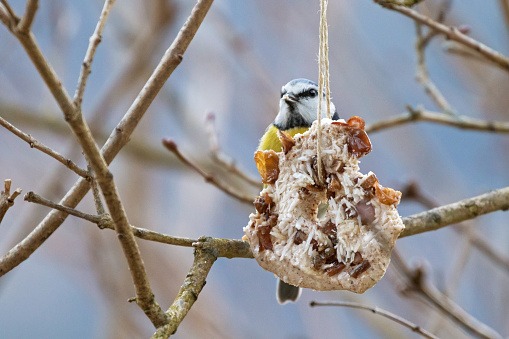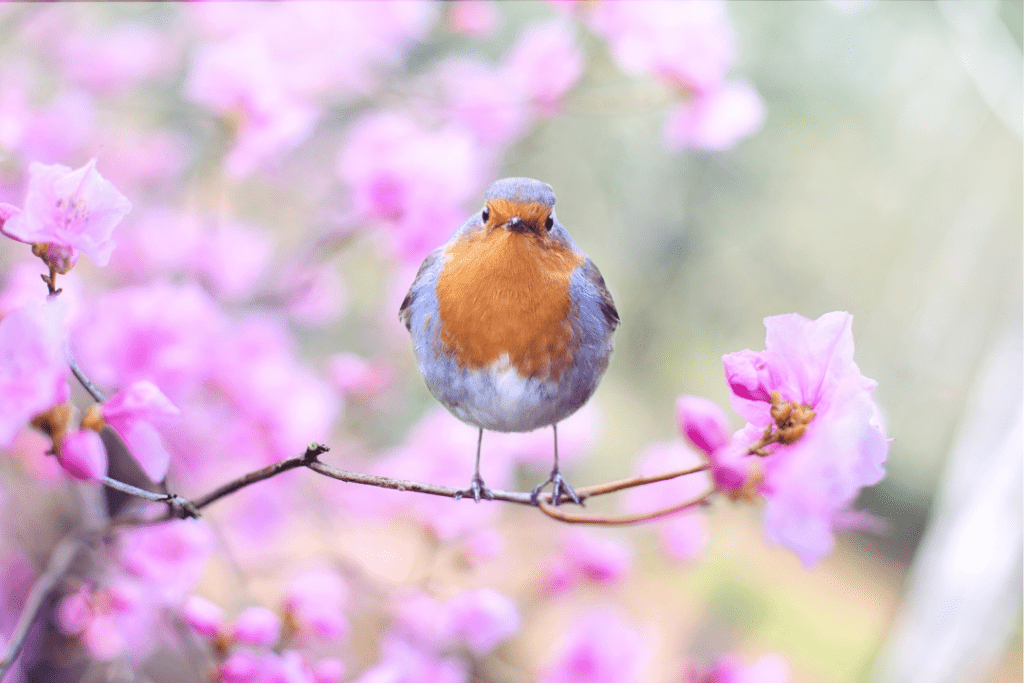In this bird feeding guide, we’ll cover:
- Do birds like raisins?
- Are raisins healthy for birds?
- How to add raisins to your backyard bird feeding area
- Other fruits you can share with birds
Do Birds Like Raisins?
Most backyard birds are somewhere on the omnivore spectrum.
Some favor insects or worms while others prefer grains and seeds. However, most species that thrive in urban and suburban settings are opportunistic eaters, able to consume many different types of foods.
Lots of birds like raisins.
Which Bird Species Like to Eat Raisins?
Species that generally enjoy fruit will be most interested in raisins. These include:
- Robins
- Mockingbirds
- Bluebirds
- Orioles
- Woodpeckers
- Waxwings
Birds that mostly favor seeds and grains, like sparrows and finches, are also happy to snack on raisins.
Are Raisins Healthy for Backyard Birds?

Most raisin production involves a natural drying process. Grapes spend days or weeks soaking in the sun, either on the vine or on trays. During this process, water leaves the grape, but nutrients remain.
Thanks to dehydration, raisins stay fresh for much longer than grapes. Bacteria, mold, and yeast require moisture, so they’re less able to colonize dried fruits.
Raisins are a minimally processed whole food—they’re simply dried, stemmed, and packaged. A package of plain raisins typically has a single-item ingredients list, consisting only of “seedless raisins.”
Like most dried fruits, raisins are nutrient-dense and full of natural sugar and fiber.
- Calories: 108
- Sugar: 21 g
- Fiber: 1 g
- Carbohydrates: 29 g
- Protein: 1 g
- Fat: 0 g
Are Raisins Safe for Pet Birds?
Raisins are safe for bird species that are commonly kept as pets, such as budgies, parakeets, and canaries. Raisins aren’t a great option as a staple food, since they don’t provide protein, but they’re a safe and appreciated treat.
How to Add Raisins to Your Bird Feeding Area
When providing raisins to birds, only use plain raisins that haven’t been coated in sugar or other flavorings.
If you want to make raisins easier to eat, soak them for a few hours. If you’re trying to attract small birds, chop the raisins in half.
You can serve raisins on their own, especially if you like to put different food types in separate feeding containers. Or, you can purchase a feed mix that includes raisins or make your own mix by combining raisins with seeds.
Birds Eating Raisins!
Other Fruits You Can Share With Birds
Compared to grapes, raisins are lower-priced and stay fresh longer. However, grapes are also a healthy snack for birds. Grapes are less nutrient-dense, but they provide more moisture.
Lots of other fruits are safe and healthy for birds. However, don’t add new foods to your feeding area without making sure they’re safe.
Stick with whole, unprocessed foods—nothing coated with salt, extra sugar, or preservatives.
Avocado is highly toxic for birds. Likewise for onions and garlic.
Additionally, seeds and pits from the following fruits are toxic and should never be given to birds:
- Apple
- Pear
- Peach
- Nectarine
- Plum
- Apricot
Along with grapes and raisins, the best fruits to offer to birds include sliced apples, sliced oranges, blueberries, raspberries, and watermelon.
Fruit is healthy for birds, but you might have better luck attracting birds with seeds. Familiarity is important, and birds are most used to seeing seed mixes in backyard feeding areas. Fruit is most likely to be eaten when it’s served alongside some seeds.
Finally, keep in mind that fresh fruit goes bad quickly, although that’s less of an issue with dried fruit like raisins.
To avoid dirtying and contaminating a feeding area, serve fresh fruit in a plastic bowl that you can bring inside to clean between feedings.
In the summertime, birds can usually find plenty of fresh fruit on their own. Plus, fruit in the summer heat quickly attracts wasps and other insects. However, in the wintertime, fresh or dried fruit is a great way to provide your visitors with some variety and sweetness.

Kelly is an environmental science writer, naturalist, and birdwatcher. Kelly holds a master’s degree in environmental policy and has worked as an environmental analyst, urban planner, and professor of environmental planning.

